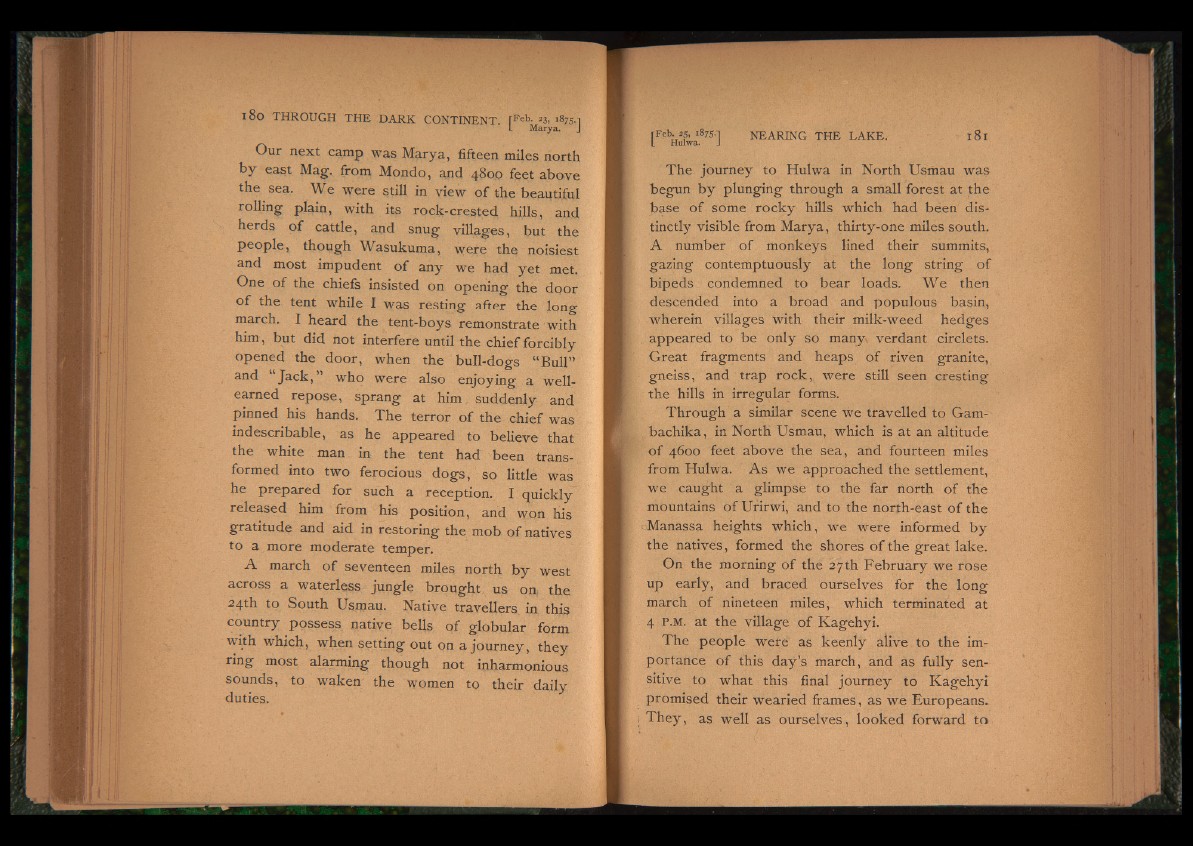
Our next camp was Marya, fifteen miles north
b y east Mag. from Mondo, and 4800 feet above
the sea. W e were still in view o f the beautiful
rolling plain, with its rock-crested hills, and
herds o f cattle, and snug villages, but the
peop le , though Wasukuma, were the noisiest
and most impudent o f any we had y e t met.
One o f the chiefs insisted on opening the door
o f the tent while I was resting after the long
march. I heard the tent-boys remonstrate with
him, but did not interfere until the chief forcibly
opened the door, when the bull-dogs “ Bull”
and Jack, who were also enjoying a wellearned
repose, sprang at h im. suddenly and
pinned his hands. The terror o f the chief was
indescribable, as he appeared to believe that
the white man in the tent had been transformed
into two ferocious dogs, so little was
he prepared for such a reception. I quickly
released him from his position, and won his
gratitude and aid in restoring the mob o f natives
to a more moderate temper.
A march o f seventeen miles north b y west
across a waterless jungle brought us on, the
24th to South Usmau. Native travellers in this
country possess native bells o f globular form
with which, when setting out on a journey, they
ring most alarming though not inharmonious
sounds, to waken the women to their daily
duties.
rFeb. 25, 1875.-] NEARING THE LAKE.
L Hulwa. J
The journey to Hulwa in North Usmau was
begun b y plunging through a small forest at the
base o f some ro ck y hills which had been distinctly
visible from Marya, thirty-one miles south.
A number o f monkeys lined their summits,
gazing contemptuously at the long string o f
bipeds condemned to bear loads. W e then
descended into a broad and populous basin,
wherein villages with their milk-weed hedges
appeared to be only so many, verdant circlets.
Great fragments and heaps o f riven granite,
gneiss, and trap ro c k n were still seen cresting
the hills in irregular forms.
Through a similar scene we travelled to Gam-
bachika, in North Usmau, which is at an altitude
o f 4600 feet above the sea, and fourteen miles
from Hulwa. A s we approached the settlement,
we caught a glimpse to the far north o f the
mountains o f Urirwi, and to the north-east o f the
oManassa heights which, we were informed b y
the natives, formed the shores o f the great lake.
On the morning o f the 27th February we rose
up early, and braced ourselves for the long
march o f nineteen miles, which terminated at
4 P.M. at the village o f Kagehyi.
The people were as keenly alive to the importance
o f this d a y ’s march, and as fully sensitive
to what this final journey to K a g eh y i
promised their wearied frames, as we Europeans,
i T h e y , as well as ourselves, looked forward to